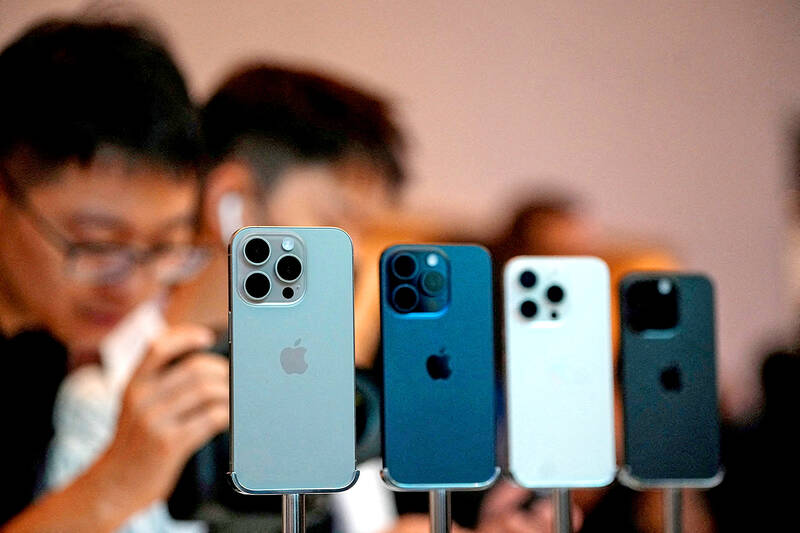Apple Inc’s iPhone staged a rebound in China last month with shipments rising 52 percent amid a flurry of discounts from retail partners.
The latest figures from the China Academy of Information and Communications Technology showed smartphone shipments surging in the country, of which about 3.5 million units came from foreign brands, according to a Bloomberg calculation.
The iPhone accounts for the vast majority of such devices, and its rebound comes after it registered growth in March following steep declines in the first two months of the year.

Photo: Reuters
Apple and its Chinese resellers have been cutting prices since the start of this year, and those deals are extending into the sale season that accompanies the June 18 shopping festival in the country.
Cupertino, California-based Apple had seen double-digit declines in sales of its latest generation of handsets, as it lost premium market share to Huawei Technologies Co (華為).
“The growth reflects two things: Apple was preparing for the 618 online shopping festival, which we could see from its recent price discounts,” said Will Wong, an analyst at industry tracker International Data Corp. “The resilient high-end users showed signs of buying better mobile devices to use for a longer time, which in turn will lead to longer replacement cycles.”
April is traditionally a low-volume month for the iPhone maker and so small changes in purchases can result in large swings.
Earlier this month, a Bloomberg Intelligence poll of consumers in China showed the iPhone returning as the most favored mobile device and an uptick in interest in upgrading to new devices.
“The iPhone’s shrinking China market share could stabilize soon, as our latest survey shows Apple’s comeback as Chinese consumers’ favorite smartphone brand after being displaced by Huawei,” Bloomberg Intelligence analysts Steven Tseng (曾緒良) and Sean Chen wrote.
“We believe the reversal in user interest could be due to the premiumization trend in China,” they wrote. “More than half of survey respondents say they’re willing to spend more than 4,000 yuan [US$552] on their next phone vs just 33 percent who currently use premium handsets.”

CHIP RACE: Three years of overbroad export controls drove foreign competitors to pursue their own AI chips, and ‘cost US taxpayers billions of dollars,’ Nvidia said China has figured out the US strategy for allowing it to buy Nvidia Corp’s H200s and is rejecting the artificial intelligence (AI) chip in favor of domestically developed semiconductors, White House AI adviser David Sacks said, citing news reports. US President Donald Trump on Monday said that he would allow shipments of Nvidia’s H200 chips to China, part of an administration effort backed by Sacks to challenge Chinese tech champions such as Huawei Technologies Co (華為) by bringing US competition to their home market. On Friday, Sacks signaled that he was uncertain about whether that approach would work. “They’re rejecting our chips,” Sacks

Taiwan’s exports soared 56 percent year-on-year to an all-time high of US$64.05 billion last month, propelled by surging global demand for artificial intelligence (AI), high-performance computing and cloud service infrastructure, the Ministry of Finance said yesterday. Department of Statistics Director-General Beatrice Tsai (蔡美娜) called the figure an unexpected upside surprise, citing a wave of technology orders from overseas customers alongside the usual year-end shopping season for technology products. Growth is likely to remain strong this month, she said, projecting a 40 percent to 45 percent expansion on an annual basis. The outperformance could prompt the Directorate-General of Budget, Accounting and

NATIONAL SECURITY: Intel’s testing of ACM tools despite US government control ‘highlights egregious gaps in US technology protection policies,’ a former official said Chipmaker Intel Corp has tested chipmaking tools this year from a toolmaker with deep roots in China and two overseas units that were targeted by US sanctions, according to two sources with direct knowledge of the matter. Intel, which fended off calls for its CEO’s resignation from US President Donald Trump in August over his alleged ties to China, got the tools from ACM Research Inc, a Fremont, California-based producer of chipmaking equipment. Two of ACM’s units, based in Shanghai and South Korea, were among a number of firms barred last year from receiving US technology over claims they have

BARRIERS: Gudeng’s chairman said it was unlikely that the US could replicate Taiwan’s science parks in Arizona, given its strict immigration policies and cultural differences Gudeng Precision Industrial Co (家登), which supplies wafer pods to the world’s major semiconductor firms, yesterday said it is in no rush to set up production in the US due to high costs. The company supplies its customers through a warehouse in Arizona jointly operated by TSS Holdings Ltd (德鑫控股), a joint holding of Gudeng and 17 Taiwanese firms in the semiconductor supply chain, including specialty plastic compounds producer Nytex Composites Co (耐特) and automated material handling system supplier Symtek Automation Asia Co (迅得). While the company has long been exploring the feasibility of setting up production in the US to address